 What are they?
What are they?
Why are they important?
Are they really good for us, or is it just marketing hype about another “healthy food?”
These are the questions we are often asked about flax seeds. We are happy to report that, while they may be tiny, they provide a HUGE nutritional punch…
…which is why they are the January Superfood of the Month!
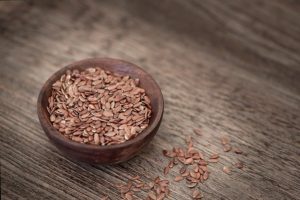 Flax seeds have actually been around for thousands of years, but they have become more popular the last few years due to their health benefits.
Flax seeds have actually been around for thousands of years, but they have become more popular the last few years due to their health benefits.
You may have even noticed them showing up in crackers, cereals, waffles, oatmeal and other foods where food companies can boast about their nutritional benefits. We want to help you understand what they are and how to include this nutrient powerhouse in your routine!
What are flax seeds?
Also known as linseeds, these small seeds are a little larger than a sesame seed and can be found in brown and “golden” varieties.
Why are they important?
Flax seeds are an amazing nutrient source:
- Great source of omega 3 fatty acids (see our coaching tip on the anti-inflammatory benefits of omega 3), which are especially important for heart health. And, flax seeds are a great alternative for those who choose not to eat fish.
- Richest source of Lignan precursors! Lignans are phytochemicals produced in your body, specifically in your colon, and are believed to be one of the main factors that cause diets high in plant foods to be protective against cancer. Flax seeds contain the highest concentration of lignan precursors, but they are also found in all seeds, beans and legumes, whole-grains and berries.
- Loaded with fiber and protein! Just 3 Tbsp of flax seeds provide 8 grams of fiber (the perfect remedy for irregularity) and 6 grams of protein, plus many other vitamins and minerals.
But it doesn’t stop there! Flax seeds are also known to reduce LDL (bad cholesterol), prevent diabetes, fight kidney disease, reduce sugar cravings…and get this, they have even been known to reduce hot flashes in women!
What is the difference between flax seeds and ground flax?
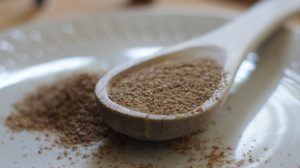 Flax seeds are the seeds in their whole form, and ground flax is just how it sounds…the seeds ground into a coarse flour form. You may find it under different names at the store…whether it is called ground, milled or flax meal, it’s all the same.
Flax seeds are the seeds in their whole form, and ground flax is just how it sounds…the seeds ground into a coarse flour form. You may find it under different names at the store…whether it is called ground, milled or flax meal, it’s all the same.
You may also find brown or golden flax seeds…again, the nutrition is virtually the same. Just know that the brown flax seeds may give your food a darker color. (For example, using ground golden flax seeds in our Lemon Chia Seed Muffins will give them a brighter yellow color.)
You will reap more benefits by choosing the ground version!
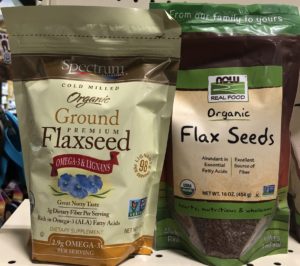 When deciding between whole and ground flax seeds, keep in mind that ground flax seeds allow our bodies to better absorb the nutrients. This is because the whole flax seeds, thanks to their insoluble fibrous coating, are more likely to pass through our bodies undigested, meaning we don’t get all the nutrition they have to offer. This doesn’t mean you have to avoid whole flax seeds — they are still beneficial, just less so.
When deciding between whole and ground flax seeds, keep in mind that ground flax seeds allow our bodies to better absorb the nutrients. This is because the whole flax seeds, thanks to their insoluble fibrous coating, are more likely to pass through our bodies undigested, meaning we don’t get all the nutrition they have to offer. This doesn’t mean you have to avoid whole flax seeds — they are still beneficial, just less so.
When buying foods at the store that contain flax seeds, look at the ingredient label to see if they are whole or ground. Because the whole flax seeds are more shelf-stable, many commercially-produced products will contain whole seeds vs. ground.
You can grind your own! If you have whole flax seeds, you can use a coffee or spice grinder to grind them just before using (or grind up enough for the week or month and store tightly covered in the fridge or freezer).
What is flax seed oil?
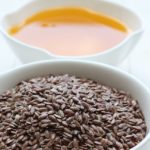 You can also consider using flax seed oil. Unfortunately, the oil contains just part of the seed, so it doesn’t provide the same nutrition as the seeds. Flax seed oil can be used in place of other oils for homemade dressings, or added to smoothies, yogurt or oatmeal. Flax seed oil can oxidize easily so it is best to not use it in cooking with heat, but rather in foods after cooking.
You can also consider using flax seed oil. Unfortunately, the oil contains just part of the seed, so it doesn’t provide the same nutrition as the seeds. Flax seed oil can be used in place of other oils for homemade dressings, or added to smoothies, yogurt or oatmeal. Flax seed oil can oxidize easily so it is best to not use it in cooking with heat, but rather in foods after cooking.
The combination of organic flaxseed oil and organic cottage cheese is actually part of an anticancer treatment known as the Budwig protocol (of course, combined with a healthy plant-rich diet including a variety of fruits and vegetables). It is also best to store flax seed oil in the refrigerator to retain freshness.
How do you store flax seeds?
Whole flax seeds should be stored in a cool dark place until you grind them. They can be stored in whole form at room temperature for one year. Ground flaxseeds should be stored in a tightly sealed container in the refrigerator for ideally only a few weeks, but can be kept up to 6 months or in the freezer for one year. Keeping them in the fridge or freezer will keep them from oxidizing and losing their nutritional potency.
How do you include flax seeds in your routine?
Flax seeds have a very neutral taste, which makes them ideal to add to a wide variety of meals. If consumed every day, a recommended daily dose of flax seeds is 1-2 Tbsp. There are many ways to include flax seeds into foods you may already be eating:
 Blend it up! Add to smoothies, such as the Super Pink Strawberry Smoothie.
Blend it up! Add to smoothies, such as the Super Pink Strawberry Smoothie.- Power up your breakfast or snack! Add to any bowl of cereal (hot or cold), to your homemade granola, or stir into yogurt, along with a little honey and fresh fruit.
- Bake with them! They can easily be added to muffins, cookies and breads. You can replace 1/4 to 1/2 cup of flour with ground flaxseed in most recipes that call for 2 or more cups of flour. Try it in our Baked Oatmeal Cups and Chocolate Chip Banana Bread.
- Healthify your hearty meals! Add to casseroles, stews, meatloafs, sauces and meatballs. For a 4 serving dish, you can add 2-4 Tbsp of ground flax seed.
- Egg substitute! Mix 1 Tbsp of ground flax seed with 2 Tbsp of warm water, let sit for 2-3 minutes to thicken and then add to recipes instead of an egg.
Get started! Take the Superfood Challenge and, if you are not already, start including these little nutritional power-packed seeds into your meals. A good goal to shoot for is “1 tablespoon a day”. Try them different ways — your health will thank you!
Do you have a favorite way to include flax seeds into your routine? Please share with us!
 LEARN MORE ABOUT THE NAPKIN!
LEARN MORE ABOUT THE NAPKIN!

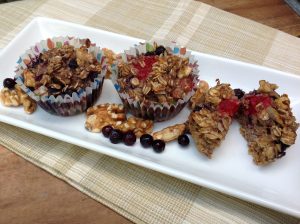
Leave A Comment